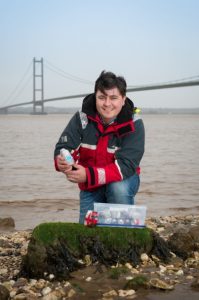Over £700,000 of funding helps university go with the flow

Over £700,000 of funding will help the University of Hull secure three state-of-the-art pieces of equipment to improve understanding of how water flows.
The new technology, made possible by significant funding from the Natural Environment Research Council’s (NERC) 2020 Capital Call, will help experts to address key challenges in water flows.
Applications include the flow of water filled with sediments, how pollutants like microplastics are dispersed by rivers and oceans, and the impact of tides and waves on wind turbine towers.
The successful bid for the equipment was led by the university’s Energy & Environment Institute.

Dr Robert Dorrell
Dr Robert Dorrell, project lead, said: “The flow of fluids, and associated transport of materials, underpins many key natural and industrial processes.
“Until now much of our understanding has relied on limited computer-based simulations but this new equipment will allow us to measure these flows in unprecedented detail; this funding enables a step-change in national research capabilities.”
As well as the £720,000 NERC Capital Call funding, the project has been supported by over 30 UK university, research centre, industry and policymaker partners and a further £150,000 of investment from the University of Hull.
The equipment will be available for national use, benefitting academics and industry, either through use of University of Hull facilities or equipment loan.
Professor Dan Parsons, project co-investigator and director at the Energy and Environment Institute, said: “The university’s expertise in water, low-carbon energy and sustainable growth is renowned globally.
“This major funding will enable expansion of our nationally and globally-leading research and reinforce our status as leaders in the area of environmental and industrial fluid dynamics.
“Our knowledge and leadership in the fields of climate change and renewable energy is a catalyst for regional economic development, and helps businesses reduce their carbon footprint and become more flood resilient too.”

Professor Dan Parsons
Dr Rob Thomas, project co-investigator, added: “In pushing the boundaries of present-day flow measurement capabilities and making this equipment available to other academics and industry, the University of Hull is supporting both UK leadership in environmental science and development and encouraging business innovation and growth.”
The new equipment will enable researchers to make crucial advances in the global measurements of environmental flows and fluid dynamics, from lab settings to the real world.
The three pieces of equipment are:
- A tomographic integrated Particle Image Tracking Velocimetry – Laser Induced Fluorescence (PITV-LIF) system, which at lab-scale allows researchers to simultaneously measure 3D flow velocity, temperature and sediment concentration in water in a way never seen before.
- A tomographic Under Water – Particle Tracking Velocimetry (UW-PTV) system, which for the first time will enable scaling of laboratory research to real-world environments.
- A tomographic UltraSound (TUS) system, which will enable simultaneous 3D measurements of flow velocity and suspended particle dynamics in sediment laden flows.
Dr Stuart McLelland, project co-investigator, said: “These innovative measurement devices are transformational and give us the unique ability to quantify complex flows at high frequencies, enabling us to resolve the dynamics of flows in a wide range natural and industrial settings.”
Dr Iain Williams, director of strategic partnerships at NERC, said: “Keeping pace with the latest opportunities afforded by developments in research infrastructure is essential to generate cutting-edge research, improve our knowledge of the global environment and provide solutions to environmental challenges.
“This funding will help UK researchers to study and tackle major issues such as the impacts of climate change and pollution of our air and water.
“These investments will help safeguard the community’s ability to carry out exceptional science, maintaining the UK’s position as a leader in environmental research and innovation.”








